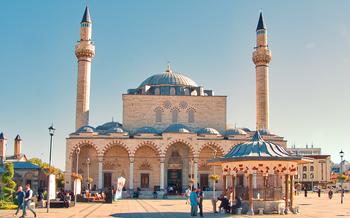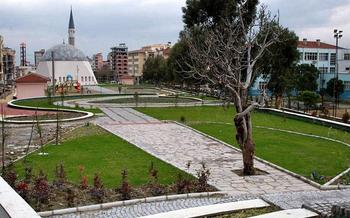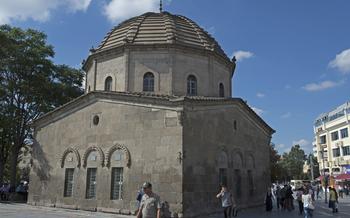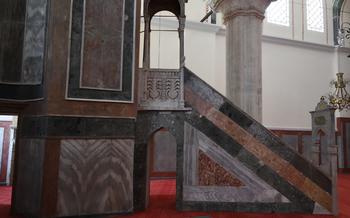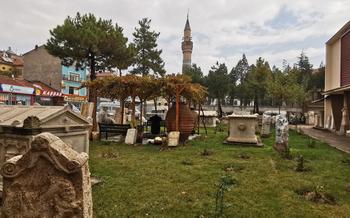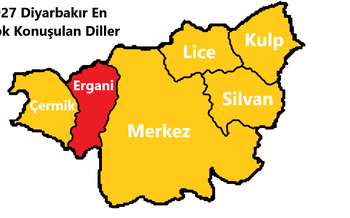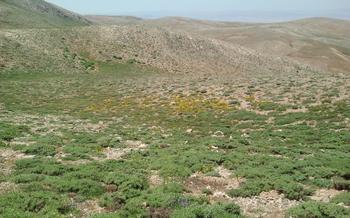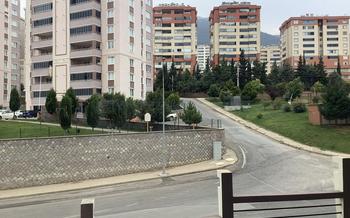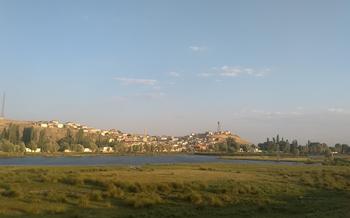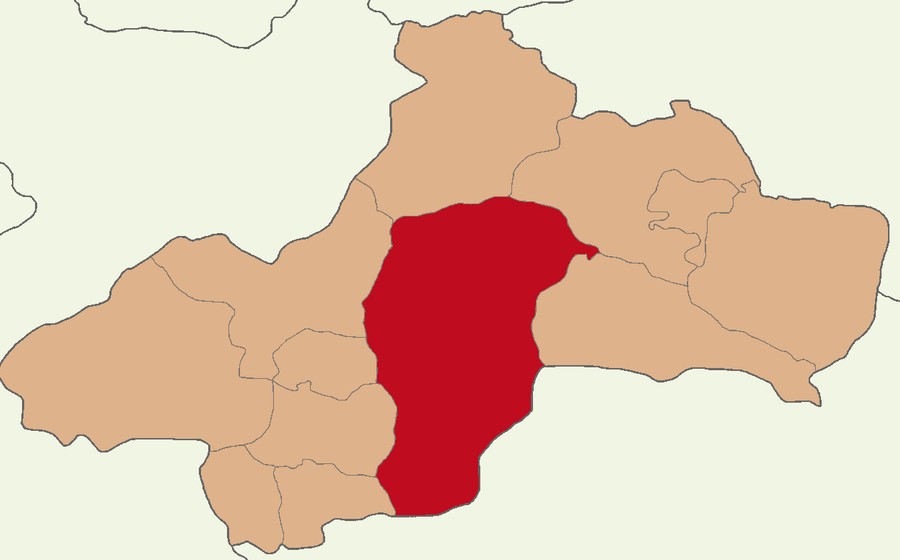
Ahi Evran Mosque and Tomb
- The Ahi Evran Mosque and Tomb: A Spiritual Haven
- Exploring the Enchanting Interiors
- Immerse in Local Culture
- Unveiling the History of Ahi Evran
- A Journey Through Time
- A Symbol of Unity
- A Place of Reflection
- Architectural Masterpiece
- Experiencing Local Craftsmanship
- Pilgrimage Destination
- A Living Legacy
- A Center of Learning
- Inspiring Stories and Legends
- Insider Tip:
The Ahi Evran Mosque and Tomb: A Spiritual Haven
The Ahi Evran Mosque and Tomb, nestled in the heart of Tokat, Turkey, stands as a testament to the rich history and spiritual heritage of the region. Built in the 13th century by Ahi Evran, a renowned Sufi saint and founder of the Ahi Order, this architectural marvel has become a beacon of spirituality and a symbol of religious harmony.
Ahi Evran, a revered figure in Turkish history, dedicated his life to promoting trade, ethics, and Islamic values. His teachings emphasized honesty, integrity, and social responsibility, leaving an indelible mark on Turkish culture and society. The mosque, named after him, serves as a tangible reminder of his legacy and the principles he espoused.
Featuring a blend of Seljuk and Ottoman architectural styles, the mosque showcases intricate carvings, tilework, and calligraphy, reflecting the artistic prowess of its era. Its graceful dome, supported by elegant columns, adds to the mosque's grandeur and creates a sense of awe and tranquility.
As a significant religious site, the Ahi Evran Mosque attracts pilgrims and visitors from far and wide. Devotees seek blessings and spiritual guidance within its sacred walls, finding solace and inspiration in the teachings of Ahi Evran. The mosque's serene atmosphere and spiritual aura provide a sanctuary for contemplation and self-reflection, making it a place of profound religious significance.
Exploring the Enchanting Interiors
Venturing inside the Ahi Evran Mosque is like stepping into a realm of tranquility and awe. The mosque's interior captivates with its unique features, intricate decorations, and serene atmosphere. The walls are adorned with mesmerizing calligraphy, verses from the Quran beautifully inscribed in flowing Arabic script. The intricate tilework, with its vibrant colors and geometric patterns, adds to the mosque's visual splendor. The ceiling, a masterpiece of craftsmanship, features stunning paintings and carvings that depict celestial motifs and floral designs. The harmonious blend of colors, patterns, and textures creates a visually captivating space that invites contemplation and reflection.
At the heart of the mosque lies the tomb of Ahi Evran, a revered figure in Turkish history. The tomb is adorned with intricate carvings and inscriptions that pay homage to his teachings and contributions. The presence of the tomb adds a spiritual aura to the mosque, attracting devotees and visitors seeking blessings and guidance. The tranquil ambiance and serene atmosphere of the mosque make it an ideal place for contemplation and self-reflection, inviting visitors to connect with their inner selves and seek spiritual solace.
Immerse in Local Culture
The Ahi Evran Mosque and Tomb is not just a religious site but also a cultural hub that reflects the rich traditions and customs of Tokat. Ahi Evran's teachings on ethics, honesty, and craftsmanship have left an indelible mark on Turkish culture. The mosque serves as a reminder of his legacy and continues to inspire generations.
Visitors can interact with the friendly locals and listen to their stories about Ahi Evran and his teachings. The mosque also hosts various festivals and events throughout the year, providing a glimpse into the vibrant local culture. These events showcase traditional Turkish music, dance, and cuisine, allowing visitors to immerse themselves in the rich heritage of the region.
Moreover, visitors can explore the surrounding area and discover the many historical sites and landmarks that Tokat has to offer. From ancient ruins to Ottoman-era architecture, the city is a treasure trove of cultural and historical wonders.
Unveiling the History of Ahi Evran
In the heart of Tokat, the name Ahi Evran reverberates through time, symbolizing a man whose teachings and contributions left an indelible mark on the region. Born in the 12th century, Ahi Evran was a prominent figure who dedicated his life to promoting trade, commerce, and ethical principles. He established the Ahi Order, a guild-like organization that championed fair trade practices, honesty, and integrity. Through his teachings, Ahi Evran instilled a strong sense of community and unity among the local artisans and merchants. His philosophy emphasized hard work, justice, and mutual respect, creating a thriving economic and social environment in Tokat.
Ahi Evran's legacy extended beyond the realm of commerce. He was a respected spiritual leader who emphasized the importance of compassion, charity, and service to others. His teachings resonated with people from all walks of life, fostering a sense of brotherhood and unity that transcended religious and social boundaries. Ahi Evran's teachings continue to be revered and practiced by many in the region, serving as a testament to the enduring impact of his life and work.
A Journey Through Time
The Ahi Evran Mosque has stood witness to the passage of time, enduring through centuries of change and evolution. Over the years, the mosque has undergone several renovations and modifications, each reflecting the architectural styles and influences of its respective era.
In the 14th century, the mosque underwent significant expansion and embellishment under the patronage of the Ottoman Sultan Murad I. During this period, the mosque's courtyard was enlarged, and the characteristic Ottoman-style dome was added, symbolizing the mosque's growing prominence and importance.
The mosque's minaret, a striking landmark visible from afar, was constructed during the reign of Sultan Mehmed II in the 15th century. The minaret's intricate tilework and elegant proportions showcase the artistic prowess of the Ottoman artisans.
In the 19th century, the mosque underwent extensive restoration efforts under the direction of Sultan Abdulmejid. These renovations aimed to preserve the mosque's original features while incorporating modern techniques and materials to ensure its structural integrity.
Today, the Ahi Evran Mosque stands as a testament to its rich history, blending architectural elements from various periods into a harmonious and cohesive whole. The mosque's enduring resilience and significance are a reminder of its enduring role as a spiritual and cultural landmark in Tokat.
A Symbol of Unity
The Ahi Evran Mosque and Tomb stands as a testament to the harmonious coexistence of different faiths in Tokat. Throughout history, the city has been home to a diverse population, including Muslims, Christians, and Jews. Despite their religious differences, the people of Tokat have lived together in peace and mutual respect. The mosque itself is a symbol of this unity, as it is open to visitors of all faiths. Whether you are a Muslim seeking spiritual guidance, a Christian admiring the mosque's architecture, or a Jewish visitor interested in the city's history, you are welcome to step inside and experience the mosque's serene atmosphere. The Ahi Evran Mosque and Tomb is a reminder that people of different religions can live together in peace and harmony, working together to build a better community for all.
A Place of Reflection
Amidst the hustle and bustle of Tokat, the Ahi Evran Mosque and Tomb offers a sanctuary for reflection and contemplation. Its serene atmosphere invites visitors to pause, breathe deeply, and connect with their inner selves. The mosque's simple yet elegant design, with its muted colors and soft lighting, creates a tranquil space that encourages introspection.
As you step inside the mosque, a sense of peace washes over you. The gentle murmur of prayers and the faint scent of incense fill the air, creating a deeply spiritual ambiance. This is a place where you can leave behind your worries and find solace in the presence of the divine.
Whether you are a devout Muslim seeking spiritual guidance or simply someone looking for a moment of tranquility, the Ahi Evran Mosque and Tomb is a place where you can find what you seek. Here, you can sit in silence, meditate, or simply bask in the serene atmosphere. The mosque's serene beauty and spiritual energy will help you connect with your inner self and find inner peace.
Architectural Masterpiece
The Ahi Evran Mosque stands as a testament to the architectural brilliance and artistry of its creators. The mosque seamlessly blends Seljuk and Ottoman architectural styles, resulting in a unique and harmonious masterpiece. Intricate carvings, tilework, and calligraphy adorn every corner of the mosque, showcasing the exceptional craftsmanship of the artisans involved in its construction. The intricate details and motifs found throughout the mosque create a visually stunning display that transports visitors to a bygone era. The mosque's architecture is a testament to the rich cultural heritage and artistic traditions of Tokat, showcasing the region's commitment to preserving its historical legacy.
Experiencing Local Craftsmanship
The Ahi Evran Mosque and Tomb also serves as a showcase for traditional Turkish arts and crafts. Skilled artisans have adorned the mosque with intricate carvings, tilework, and calligraphy, demonstrating their mastery of these ancient techniques. Visitors can witness live demonstrations of these traditional crafts and purchase handmade souvenirs to take home as cherished mementos of their visit. These artisans, with their skillful hands, breathe life into beautiful creations that reflect the rich cultural heritage of Tokat.
Pilgrimage Destination
The Ahi Evran Mosque and Tomb hold immense significance as a pilgrimage site, attracting devout Muslims from across the region and beyond. Believers flock to this sacred space to seek blessings, offer prayers, and pay homage to the revered figure of Ahi Evran. The mosque's spiritual aura and the presence of Ahi Evran's tomb create a profound sense of connection with the past and a deep reverence for the teachings of this influential figure. Pilgrims engage in various religious rituals and observances, including reciting prayers, performing ablutions, and seeking guidance from religious scholars. The mosque's serene atmosphere and the opportunity for spiritual reflection make it a popular destination for those seeking a meaningful and transformative pilgrimage experience.
A Living Legacy
The Ahi Evran Mosque and Tomb stand as a testament to the enduring power of tradition and cultural heritage. For centuries, the mosque has served as a beacon of faith and spirituality, shaping the identity and values of the Tokat community. It is a place where religious practices and rituals have been meticulously preserved, ensuring the continuity of cultural traditions from one generation to the next.
Within the mosque's walls, the teachings and legacy of Ahi Evran, the founder of the Ahi Order, are kept alive. His principles of honesty, integrity, and social responsibility continue to resonate with the people of Tokat, guiding their actions and shaping their way of life. The mosque serves as a tangible reminder of Ahi Evran's profound impact on the region, his teachings serving as a moral compass for generations to come.
A Center of Learning
The Ahi Evran Mosque served as a prominent center of learning, fostering intellectual pursuits and the dissemination of knowledge. Within its sacred walls, a madrasah, an Islamic school, was established, providing a sanctuary for students seeking religious and secular education. The madrasah offered a comprehensive curriculum that encompassed theology, law, philosophy, and various other subjects, nurturing the minds of young scholars.
Through the teachings imparted at the madrasah, the mosque became a hub of intellectual discourse and enlightenment. Scholars and students from diverse backgrounds gathered to engage in lively debates, exchange ideas, and deepen their understanding of various subjects. The mosque's commitment to learning extended beyond religious studies, embracing a holistic approach to education that prepared students for various roles in society.
The mosque's legacy as a center of learning continues to resonate today. Its contributions to education have left an indelible mark on Tokat, fostering a culture of intellectual curiosity and pursuit of knowledge. Visitors to the mosque can still sense the aura of scholarship that pervades its atmosphere, a testament to its enduring role as a beacon of learning and enlightenment.
Inspiring Stories and Legends
The Ahi Evran Mosque and Tomb is not just a historical and religious site; it is also a place steeped in local folklore and legends. Visitors can hear captivating tales and legends that have been passed down through generations, adding a mystical aura to the mosque's ambiance. These stories often revolve around miraculous events, acts of devotion, and the enduring power of faith.
One popular legend tells of a time when the mosque was under construction. As the workers struggled to lift a heavy stone into place, a mysterious figure appeared and effortlessly hoisted it to the top of the wall. The workers were amazed and realized that they had been assisted by a saintly being.
Another legend speaks of a devoted follower of Ahi Evran who, despite being blind, regularly attended prayers at the mosque. One day, as he stood in the courtyard, he suddenly regained his sight, overwhelmed with joy and gratitude.
These stories and legends add a touch of magic and wonder to the mosque's history, inspiring visitors with their messages of faith, hope, and the enduring legacy of Ahi Evran.
Insider Tip:
For a truly tranquil and serene experience, plan your visit to the Ahi Evran Mosque early in the morning or late in the afternoon when the crowds are thinner. Remember to dress modestly and respectfully, covering your shoulders and knees. To delve deeper into the mosque's rich history and significance, take advantage of the guided tours offered by knowledgeable locals. These tours provide fascinating insights into the mosque's architecture, symbolism, and the life of Ahi Evran. Don't miss the opportunity to explore the charming streets surrounding the mosque, where you can discover hidden gems, local shops, and traditional Turkish cafes. Embrace the vibrant culture of Tokat as you wander through its narrow alleys, soak in the local atmosphere, and interact with friendly locals.
